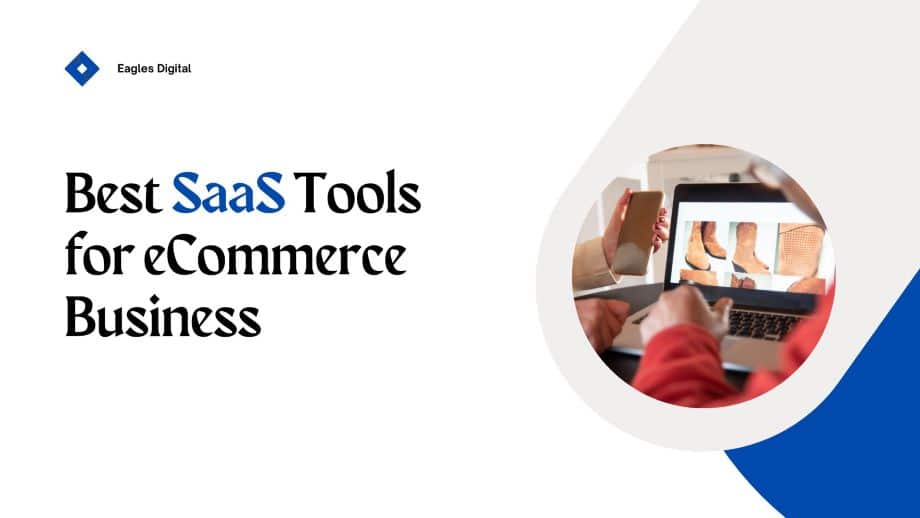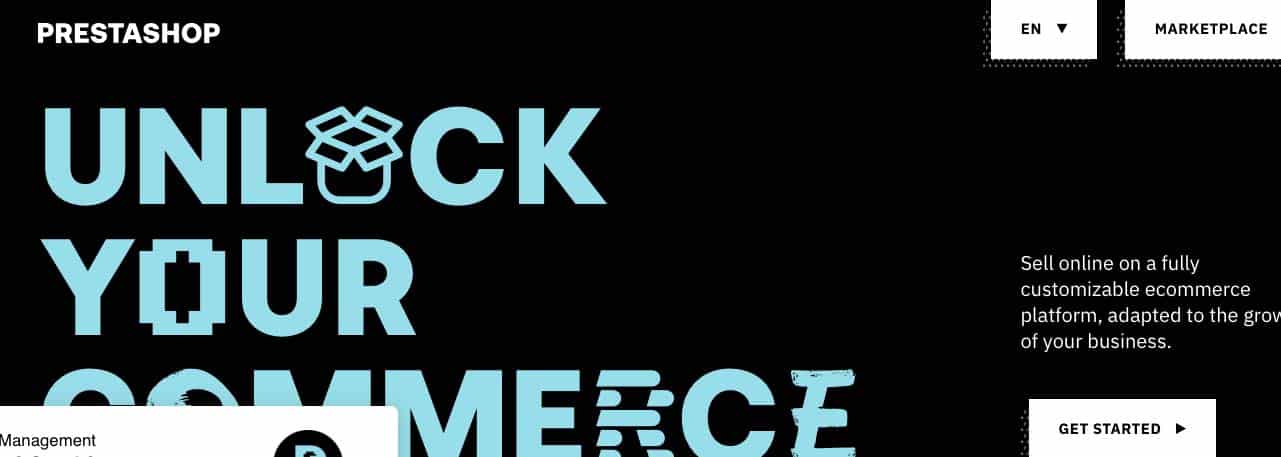11 Best SaaS Tools for eCommerce Business in 2025

Are you looking for the best SaaS tools for eCommerce business to launch a successful online store?
Running an online store can be a lot of work. But with SaaS tools, it’s much easier to manage everything from marketing to customer service.
SaaS helps eCommerce businesses automate processes, scale efficiently, engage with their audience, boost product awareness, and ultimately make more money online.
However, choosing the right SaaS platform for your eCommerce Business can be challenging.
This guide is here to help you speed up the decision-making process. I’ve ranked eleven of the top and most popular SaaS Tools for eCommerce Businesses by their best features, pros, cons, and price—so you can choose the right one for your business.
What are the Best SaaS Tools for eCommerce Business?
Here are my picks for the best SaaS tools to help you kickstart your eCommerce business this year. I have a detailed pros and cons analysis for each so that you can choose the right SaaS eCommerce platform for your needs.
1. Shopify

Shopify is the best eCommerce platform for running an online store. It is the go-to SaaS tool for eCommerce businesses of all sizes.
Shopify offers a complete eCommerce solution with features that include website creation, product management, payment processing, and shipping integrations.
In addition to providing an excellent user experience for customers, Shopify provides powerful analytics tools to help you track performance, identify trends, optimize operations, and plan for growth.
Shopify provides various templates, which allow you to build attractive, and professional eCommerce stores. These themes are easy to customize and are suitable for a wide range of industries, whether you’re selling clothing, electronics, beauty items, or other products.
It is also highly scalable, allowing you to start small and expand your online store as your business grows. Its pricing plans are flexible, making it accessible whether you’re a new startup or an established retailer.
Key Features:
- You can choose from a wide range of templates or start from scratch and build a beautiful and professional online store.
- Their Inventory Management System is designed to help ecommerce businesses efficiently track, manage, and optimize their inventory.
- Another great feature is their built-in payment gateways with support for multiple currencies.
- Pre-built reports offering valuable insights to help eCommerce businesses analyze their performance and make informed decisions. These reports are designed to give you a clear overview of key business metrics, including sales, customer behaviour, and inventory.
- You can also integrate with third-party apps for added functionality
Pricing:
There are four pricing plans available:
- Basic: $39 per month
- Shopify: $105 per month
- Advanced: $399 per month
- Plus: $2,300 per month
2. WooCommerce

WooCommerce is a free, open-source platform that lets you turn your website into an online store. You can sell physical or digital products, manage inventory, and accept payments—all for free.
With over 5 million active installations, WooCommerce is the most popular e-commerce plugin for WordPress users.
If you’re looking for the best overall eCommerce tool for WordPress, WooCommerce is an excellent option. It’s an all-in-one platform that gives you everything you need to grow your online presence.
However, you might need to add paid extensions for some advanced features.
Key Features:
- WooCommerce lets you customize your online store to fit your brand.
- You can easily add, manage, and categorize products, with support for physical, and digital products.
- Expand your store’s features with a wide range of free or paid extensions like marketing tools, advanced shipping, and CRM.
- It provides detailed sales and customer reports, helping you track performance and make data-driven decisions.
- Integrates with various payment gateways, offering flexible and secure payment options, including Stripe, PayPal, and more.
Pricing:
WooCommerce is free, but you’ll need to pay for some extra things like hosting and a domain name.
3. BigCommerce

BigCommerce is one of the most trusted SaaS e-commerce solutions that provides extensive tools and features to help businesses of all sizes build and run their online stores efficiently.
It provides an easy-to-use platform packed with powerful features, allowing you to build a professional and stunning online store that boosts sales and keeps customers engaged.
Additionally, you can set local languages, payment methods, currencies, taxes, and shipping options for each storefront, ensuring a tailored shopping experience for every customer.
BigCommerce also supports numerous digital wallets, including Apple Pay, Square, Amazon Pay, PayPal One Touch and more.
The platform provides two main products: BigCommerce Enterprise and BigCommerce Essentials.
BigCommerce Enterprise is designed for large businesses needing advanced features, scalability, and robust tools to manage complex operations and high traffic.
BigCommerce Essentials, on the other hand, is tailored for small to medium-sized businesses, offering user-friendly features and flexibility to grow as your business expands.
Key Features:
- BigCommerce offers a highly intuitive interface, making it accessible even for users with little technical expertise.
- With built-in inventory management, you can monitor stock levels and set up automated reordering processes.
- A wide selection of customizable themes, allowing you to choose from pre-designed layouts or create a unique style tailored to your brand.
- Equips you with tools to promote products through email campaigns, social media, and other marketing channels.
- The platform also provides comprehensive analytics, helping you monitor website traffic, user activity, and sales trends.
- BigCommerce is designed to grow with your business, offering scalability that supports both small startups and large enterprises.
Pricing:
You can test out the platform for free for 15 days to ensure that it’s a good option for you.
When you’re ready to pick a paid plan, these are the prices:
- Standard Plan: $39 per month
- Plus Plan: $105 per month
- Pro Plan: $399 per month
- Enterprise Plan: Custom pricing based on business needs.
4. Wix

Wix is another popular SaaS tool for eCommerce, providing a straightforward platform for creating and managing online stores. It features an intuitive drag-and-drop builder, allowing users to design custom websites without needing technical skills.
This platform is a smart choice for eCommerce business owners because it has well-designed product galleries, secure payment gateways, and tools to manage inventory and shipping.
The best part is that you don’t need to know how to code to create a professional website with Wix.
Additionally, Wix has built-in tools to help you promote your products and services online, like SEO, email marketing, and social media integration.
With flexible pricing and scalability, Wix is well-suited for small and medium-sized businesses that want to grow their online presence.
Key Features:
- Wix makes it easy to design your online store with a drag-and-drop builder. It doesn’t require any coding knowledge.
- A wide range of customizable eCommerce templates to build a visually appealing eCommerce website.
- Track inventory levels in real-time, get alerts on stock levels, and automatically update product availability.
- Their Analytics tools provide valuable insights about your website’s performance, helping you understand visitor behaviour and optimize your content for better results.
- Advanced SEO and marketing tools help improve search engine rankings and promote your store.
- Stores are automatically optimized for all devices, including smartphones and tablets, ensuring a great shopping experience across platforms.
Pricing Plans:
The following are the pricing plans with Wix:
- Business Elite: $159 per month
- Business: $36 per month
- Core: $29 per month
- Light: $17 per month
Wix also offers a free option to get you started. However, this plan comes with some limitations.
If you want to learn how to use Wix, here is my complete guide.
5. PrestaShop

PrestaShop is a powerful, open-source eCommerce solution that offers flexibility and a wide range of features for online retailers.
Trusted by over 300,000 businesses worldwide, PrestaShop offers endless customization options and scales with your growth. With dedicated support and extensive resources, you’ll have everything you need to succeed in e-commerce.
Whether you’re just starting or already established, PrestaShop is the flexible platform for your online business.
Overall, PrestaShop is a great SaaS tool with broad functionality for developers who want full control over their online store.
Key Features:
- User-friendly and intuitive admin panel for easy store management.
- With PrestaShop, you can sell your products or services in different languages and currencies, making it ideal for international businesses.
- PrestaShop offers a variety of mobile-friendly themes. You can pick a theme that suits your business, and customize it to reflect your brand.
- Responsive themes to make it easy for customers to shop on their phones or tablets.
- Product management with options for variants and customization
- It offers various reporting tools to track sales, visitors, and conversions. You can use these reports to improve your store’s performance.
- PrestaShop has an add-on marketplace with a wide range of modules that can enhance your store functionalities. This includes add-ons like SEO, email marketing, wishlists and more.
Pricing:
PrestaShop is free to use. However, you might need to pay for hosting, themes, or advanced features.
6. Square Online

Square Online offers an easy-to-use platform designed to help businesses of all sizes take card payments and manage their operations.
With a variety of tools, from payment processing to inventory management, Square empowers you to grow and succeed in your own way.
Whether you’re running an online store, Physical store, or both, Square integrates seamlessly with third-party solutions, giving you flexibility and control.
With a user-friendly dashboard, real-time insights, and customizable options, Square Online helps you streamline your business without unnecessary costs or complexity.
If you’re a beginner looking for a simple and easy-to-use platform, Square Online could be a great tool to grow your online store.
Key features:
- Well known for its intuitive interface, Square makes it easy for beginners to set up and manage their online stores. You can start with a template or build your own unique design from scratch.
- Square Online offers a good range of options to customize your store, though it may not be as extensive as some other platforms.
- It integrates seamlessly with Square’s payment processing services, making it easy to accept payments from customers.
- Mobile optimized means your store will automatically look great on mobile devices.
- Another great feature is their app marketplace which gives you access to a wide range of apps to extend the functionality of your store.
- Square’s pricing is flexible and affordable, making it a great choice for businesses on a budget.
Pricing:
Square Online offers a free plan that includes a website builder with SEO tools, unlimited products, and multiple payment methods.
If you need more advanced features, Square’s paid plans are as follows:
- Plus: $26 per month
- Premium: $72 per month
7. Volusion

Volusion is a popular hosted eCommerce platform that has been in the market since 1999. It comes with a bunch of functionality and features to help businesses create, manage and expand their online stores.
The platform also helps improve online visibility with strong SEO tools and allows users to create custom product category pages and subcategories.
One of the things I like about Volusion is that they have a team to help you market your eCommerce business.
Volusion lets you show off your best deals and products with its well-designed slideshow feature. If you know how to code, you can make your website even more unique with HTML and CSS.
key features
- An intuitive site builder that allows you to create and customize your store’s look and add new features without writing any code.
- You can choose from a variety of customizable themes to match your brand. These themes are optimized to look great on all devices.
- A simplified checkout process that enhances the user experience for both merchants and customers.
- Easily add, edit, and organize your products with comprehensive category tools.
Pricing:
Volusion doesn’t offer a free plan. To use the SaaS tool, choose from one of the following plans:
- Personal: $35 per month
- Professional: $79 per month
- Business: $299 per month
- Prime: This plan is available on request.
8. Squarespace
 Squarespace is a versatile website builder that makes it easy for anyone without technical knowledge to create a stunning website.
Squarespace is a versatile website builder that makes it easy for anyone without technical knowledge to create a stunning website.
Primarily designed for website building, Squarespace also offers powerful features that help you easily build and grow your online store.
With its built-in AI tools, you can write better product descriptions and highlight related products to enhance your sales strategy.
Squarespace offers optimized mobile store layouts for a seamless shopping experience.
They also provide various shipping options, including local delivery, pickup, and standard shipping.
If design and ease of use are your top priorities, Squarespace is a great choice. However, if you want more advanced customization options, you may consider other alternatives.
9. Ecwid

Ecwid is one of the top SaaS e-commerce platforms that lets you easily add an online store to your existing website. It offers a range of features to help you sell products and services online with ease.
The platform is simple to use and there’s no need for advanced technical skills.
Ecwid is a suitable choice for small businesses that want to add online selling capabilities to their existing website without building a separate store.
I recommend Ecwid for small businesses because its free plan gives users all the essential tools to launch their eCommerce business for free.
10. Adobe Commerce

Adobe Commerce (Magento) is another powerful e-commerce platform built with scalability and flexibility in mind.
With Adobe ecommerce you can easily manage websites with a lot of traffic and large product catalogs. This makes it a great choice for businesses of all sizes.
You can use Adobe e-commerce to build various online stores, from simple storefronts to complex marketplaces. Plus, it offers strong security features to keep your business and customers’ data safe.
The platform also has a strong number of integrations with other software tools.
Overall, Adobe Commerce is a good option for businesses that want to create a scalable e-commerce store.
11. Shift4Shop

Being one of the most affordable SaaS tools for eCommerce, Shift4Shop offers great features and a user-friendly platform to start and manage your e-commerce store.
Shift4Shop is designed to be user-friendly, even for those with limited technical knowledge.
You can easily add products with just a few clicks, including detailed descriptions and high-quality images.
One of my favorite things about Shift4Shop is its strong SEO features, which help users attract more customers and increase sales.
It also provides excellent 24/7 customer support to help you manage your e-commerce business effectively.
Shift4Shop is a great option if you’re looking for an easy-to-use online store builder with strong SEO features and marketing tools.
What are SaaS Tools for eCommerce Business?
Software as a service (SaaS) tools for eCommerce are designed to manage different parts of your eCommerce business.
With these tools, you can track inventory, manage customer data, run marketing campaigns, and handle sales in one place without installing any software on your computer.
They make it easy to process payments, improve your website’s performance, and even handle shipping.
Tools like Shopify, PrestaShop, Orbelo, Semrush, and Grammarly feature a powerful feature set for online store owners.
SaaS platforms are simple to use, accessible from anywhere, and regularly updated automatically, helping your business grow without extra effort.
These tools assist you with all the following tasks:
- Manage your inventory easily and avoid running out of stock.
- Manage customer data, monitor interactions, and enhance your customer service experience.
- Automate email campaigns, manage social media marketing and track the performance of marketing efforts.
- Automate shipping processes and track shipments
- Securely process online transactions and manage multiple payment gateways.
- Manage product listings, pricing, and product details across various channels
How to Choose SaaS Tools for eCommerce?
The right SaaS tools for eCommerce can make a big difference in helping you build a successful online store. Here are some crucial factors to consider when choosing the best SaaS platform.
Business Needs:
Identify your specific requirements, such as inventory management, payment processing, customer support, or marketing automation. The right tool should align with your goals, workflows, and challenges.
Scalability:
Look for tools that can scale with your business, ensuring you’re ready for future growth.
Fortunately, most SaaS provider’s infrastructure can easily handle your growing business without you having to worry about downtimes, backups, or security.
Whether you’re just starting or expanding, the software should be able to handle increased traffic, more products, or additional users.
Ease of Use:
You should Opt for Saas tools that are easy to use with user-friendly interfaces that don’t require a steep learning curve. This helps you and your team save time on training and get up and running faster.
Integration:
Online store owners rely on various apps and services to keep their operations running smoothly.
When selecting a Saas solution, be sure the SaaS tool integrates seamlessly with your existing systems, such as your eCommerce platform, CRM, or accounting software.
Customer Support:
Success in eCommerce depends on how quickly you can solve problems when they arise.
Having proactive customer support is vital, and the best SaaS tools offer 24/7 assistance through live chat, phone, or email, ensuring you can resolve issues promptly and keep your business running smoothly.
Pricing:
Consider the cost and make sure it fits within your budget. The best SaaS tools for eCommerce provide flexible pricing options, making it easier to find a plan that fits your budget. Many SaaS tools have free versions for beginners or small businesses.
The important thing is to choose a platform that offers the features you need at a price you can afford.
Security:
Ensure the SaaS provider offers top-notch security features to protect your sensitive data, such as customer information and payment details.
SaaS Tools for eCommerce FAQs
What are the major SaaS tools for eCommerce?
The major SaaS tools for eCommerce are Shopify, HubSpot, Stripe, Mailchimp, Zendesk, and Chargebee.
These tools will cover a wide range of functions essential to running and growing your online business.
What is the best free SaaS tool for eCommerce?
The best free SaaS tool for eCommerce is WooCommerce which is a popular free tool that provides various functionalities crucial for running an eCommerce business.
It’s a WordPress plugin that allows you to add an online store to your existing WordPress website.
How do SaaS tools benefit eCommerce businesses?
SaaS tools offer numerous benefits to eCommerce businesses, including flexibility, scalability, and cost-efficiency.
These tools allow you to access services from anywhere, automate processes, and scale as your business grows, reduce costs, and enhance the overall customer experience.
Why should I use SaaS tools for my e-commerce business?
Leveraging SaaS tools for your eCommerce business is a great way to streamline your operations, reduce costs, and enhance the customer experience.
Plus, you can easily expand your SaaS tools as your business grows.
Summary
When choosing the best SaaS tools for your eCommerce business, it’s essential to evaluate key factors such as ease of use, integration capabilities, pricing, and how each tool supports your business goals.
These SaaS tools can help you streamline operations, enhance customer experience, and boost sales.
The tools you select should provide robust features for inventory management, marketing, and sales.
However, your success depends on how well you implement these tools and how effectively you use them to grow your business.


